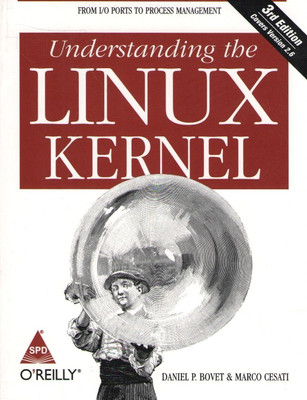Understanding the Linux Kernel(English, Paperback, Bovet Daniel P.)
Quick Overview
Product Price Comparison
Understanding The Linux Kernel provides insight into how Linux functions efficiently on a number of systems through detailed discussions on the basics of the kernel. Summary Of The Book Linux kernel, an operating system kernel, was first released in 1991 by Linus Torvalds. The kernel manages all communication between the external world and the CPU, and specifies the order and method by which programmes utilise processor time, ensuring its efficient sharing across the hundreds of processes that make demands on processor time. It is also an expert organiser of data transfers ensuring that the CPU does not wait for too long for relatively slower disks. This edition of Understanding The Linux Kernel provides insight into the most important algorithms, data structures, and programming secrets used in the kernel. The authorsŌĆÖ discussions are extensive, including discussions on individual bits of code and important Intel-related features. Significantly, they lay out the theory behind the how and why of Linux functions. This third edition of Understanding The Linux Kernel deals with Version 2.6, released in December 2003, and features discussions on the topics of memory management. The book also enumerates the changes made to the kernel subsystem, especially in the areas of block devices and memory management. In addition, the book highlights program execution, synchronization that happens inside a kernel, and Interprocess Communication. The book helps programmers and enthusiasts understand how to tease out LinuxŌĆÖs best capabilities, meet the problem of producing the right system response during file access, process scheduling, and managing memory in a wide array of situations. Understanding The Linux Kernel is more than just an academic exercise, it provides details of the inner workings of Linux, helping Linux users to make the most out of their systems. About The Authors Daniel P. Bovet was born in Paris, France, in 1939 and earned a Ph.D. in computer science at the University of California, Los Angeles. He is now a full-time Professor at the University of Rome, ŌĆ£Tor VergataŌĆØ, Italy. Before joining ŌĆ£Tor VergataŌĆØ, Bovet worked at Pisa University (1969-1078) and at the University of ŌĆ£La SapienzaŌĆØ (1979-1996). His main research interests include computational complexity and design of kernel operating systems. Marco Cesati received a Ph.D. in computer science from the University of Rome ŌĆ£La SapienzaŌĆØ. He was a postdoctoral student at the University of Rome ŌĆ£Tor VergataŌĆØ from 1996 to 1999 before joining ŌĆ£Tor VergataŌĆØ in 2000 as an Assistant Professor. Cesati currently teaches courses in operating systems, computer science basics, and computer networks. His main research interests include algorithms, computational complexity, computer networks, and operating systems.


